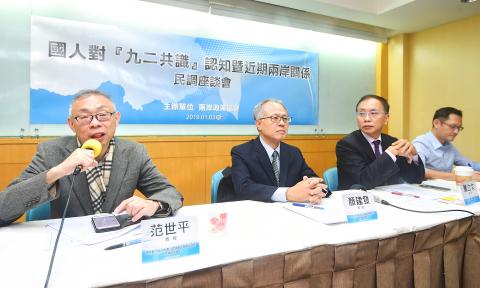More than 80 percent of Taiwanese would not accept the so-called “1992 consensus” if it meant supporting the “one China” principle, with “China” representing the People’s Republic of China (PRC), a Cross-Strait Policy Association poll showed yesterday.
The association published the poll one day after Chinese President Xi Jinping (習近平) gave a speech marking the 40th anniversary of the 1979 “Message to Compatriots in Taiwan.”
While promoting the “one county, two systems” formula, Xi said the “1992 consensus” means that “both sides of the Taiwan Strait belong to one China and will work jointly to seek national unification.”

Photo: Fang Pin-chao, Taipei Times
The “1992 consensus” — a term former Mainland Affairs Council chairman Su Chi (蘇起) admitted making up in 2000 — refers to a tacit understanding between the Chinese Nationalist Party (KMT) and the Chinese Communist Party that both sides acknowledge there is “one China,” with each side having its own interpretation of what “China” means.
Of the respondents, 84.1 percent said they would not accept the “1992 consensus” if it means supporting the idea of the PRC representing “China,” with no room left for the Republic of China (ROC), while 9 percent said they would.
Of those polled, 81.2 percent said they would not accept the “1992 consensus” if it promotes economic development at the cost of sovereignty and turns the ROC into a local government under Beijing’s control, the poll found.
Of the respondents, 54.2 percent supported reading the “1992 consensus” as meaning that each side has its own interpretation of what “China” means, with “one China” meaning the ROC.
When asked whether the “1992 consensus” is real, 45.1 percent of respondents said “no,” while 36.2 percent said “yes.”
Regarding the content of the “1992 consensus,” 55.5 percent said they did not have a clear understanding of it, while 40.2 percent said they did.
When asked to choose a definition of the “1992 consensus” that was closest to their understanding, 44.4 percent said that it means both sides of the Taiwan Strait are two different countries, while 20.9 percent said the two sides represent part of a yet-to-be-unified nation.
Of the respondents, 20.6 percent said it means each side claims to represent “China,” with 7.1 percent saying the ROC is a local government belonging to the PRC.
The poll also found that 62.6 percent of respondents approved of the government’s position respecting the historical fact that in 1992 a meeting occurred between the two institutions representing each side of the Taiwan Strait — Taiwan’s Straits Exchange Foundation and China’s Association for Relations Across the Taiwan Straits — while 28 percent disapproved.
Meanwhile, 64.1 percent of respondents said they did not agree with the statement that people do not need to know what the “1992 consensus” is as long as it brings economic benefits to Taiwan, while 91.7 said they believed that national security is as important as economic development.
The poll was conducted by telephone on Thursday and Friday last week, with 1,081 valid samples, a 2.98 point margin of error and a confidence level of 95 percent, the association said.

Chinese spouse and influencer Guan Guan’s (關關) residency permit has been revoked for repeatedly posting pro-China videos that threaten national security, the National Immigration Agency confirmed today. Guan Guan has said many controversial statements in her videos posted to Douyin (抖音), including “the red flag will soon be painted all over Taiwan” and “Taiwan is an inseparable part of China,” and expressing hope for expedited reunification. The agency last year received multiple reports alleging that Guan Guan had advocated for armed reunification. After verifying the reports, the agency last month issued a notice requiring her to appear and explain her actions. Guan

GIVE AND TAKE: Blood demand continues to rise each year, while fewer young donors are available due to the nation’s falling birthrate, a doctor said Blood donors can redeem points earned from donations to obtain limited edition Formosan black bear travel mugs, the Kaohsiung Blood Center said yesterday, as it announced a goal of stocking 20,000 units of blood prior to the Lunar New Year. The last month of the lunar year is National Blood Donation Month, when local centers seek to stockpile blood for use during the Lunar New Year holiday. The blood demand in southern Taiwan — including Tainan and Kaohsiung, as well as Chiayi, Pingtung, Penghu and Taitung counties — is about 2,000 units per day, the center said. The donation campaign aims to boost

The Kaohsiung Tourism Bureau audited six hotels in an effort to prevent price gouging ahead of Korean band BTS’ concert tour in the city scheduled for Nov. 19, 21 and 22 this year. The bureau on Friday said that the audits — conducted in response to allegations of unfair pricing posted on social media — found no wrongdoing. These establishments included the local branches of Chateau de Chine, Hotel Nikko, My Humble House, and Grand Hai Lai, it said, adding that the Consumer Protection Commission would have penalized price gougers had the accusations been substantiated. The bureau said the Tourism Development Act

The military yesterday said it has located the flight data recorder, or black box, of an F-16V jet that disappeared off eastern Taiwan earlier this month, and it would soon deploy a salvage team to try to retrieve it. Air Force Command Headquarters said that while it had pinned down the location of the black box, it was still searching for the aircraft’s sole pilot, air force Captain Hsin Po-yi (辛柏毅). Without providing details, the air force said it had located the black box days after detecting some intermittent signals and would now engage a team of professionals to retrieve it. The air